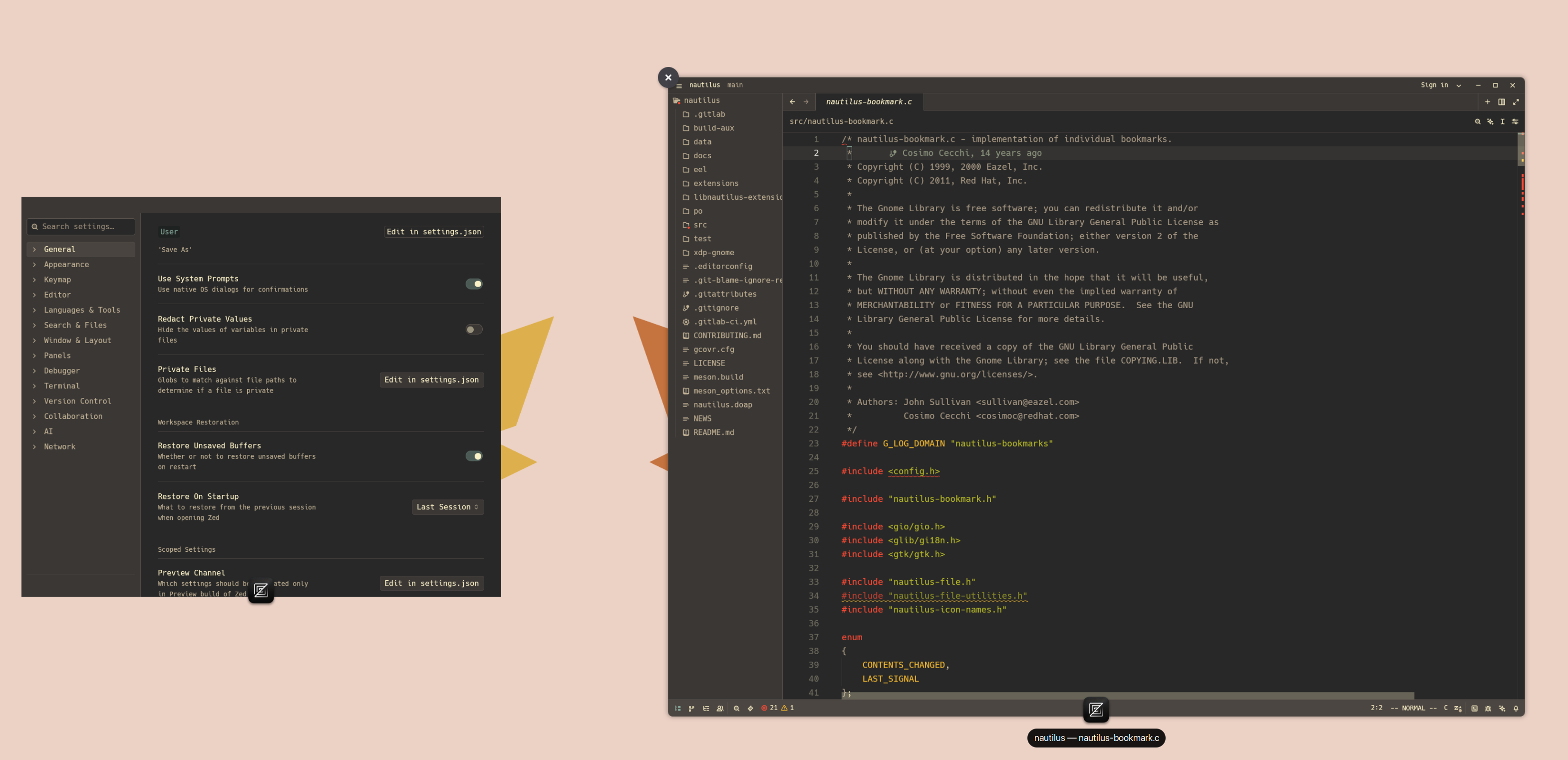Hmm… I was checking #zed website and found it quite visualy pleasing and it struck me! you know what? it's not fucking extremely ROUND! It's mostly square with only very subtle rounding here and there!
I tested the Maple Mono font in the #Zed editor. The “a” glyph was too round for my liking. Thankfully, the font has character variants that can be selected in Zed’s settings.json:
"buffer_font_features": {
"cv02": true // ‘a’ with top arm
}
Neato!
I switched from VSCode to Zed
https://tenthousandmeters.com/blog/i-switched-from-vscode-to-zed/
#HackerNews #VSCode #Zed #Switch #Coding #Experience #Developer #Tools
#zed remote dev + waypipe is a really cool combination that makes hacking on Rust GUI applications from my 10 y/o #Thinkpad actually feasible. All the building and running happens on my desktop over tailscale. #linux
This obviously can be adapted to any editor or just run from a terminal. Here's the code for the zed task if anyone is interested: https://github.com/Fingel/gelly/commit/d83b56e85c914b9bdd7372f3af6685295ee313ca
RE: https://autonomous.zone/@exegete/115756249425305617
This #zed editor is a crime against humanity. If you use a text editor that requires a GPU, you are deeply unserious.
Why arent we #GUI yet?
https://www.youtube.com/watch?v=rpEU9DNbXA4
Why arent we #GUI yet?
https://www.youtube.com/watch?v=rpEU9DNbXA4
After many years with #VSCode, I think #Zed will become my new go-to editor. Apart from the huge performance boost, there are several features and UI details that simplify my workflow.
I also enjoy how despite being written in #Rust, there are plenty of ways to customise the experience via settings and extensions.
A very promising future for #softwareDevelopment
Working on a snippet extension for #Rust in #Zed
Get it here:
https://github.com/timlau/zed-rust-snippets
Working on a snippet extension for #Rust in #Zed
Get it here:
https://github.com/timlau/zed-rust-snippets
Anyone in our circles using #Zed?
What makes it appealing?
After being a dedicated Vim/Neovim user for over 20 years, I somewhat reluctantly switched to VS Code about five years ago when I started coding in TypeScript, mainly pulled in by its ecosystem. However, I've recently started using #Zed, and I'm incredibly satisfied. One of the biggest reasons I always loved Vim/Neovim was its lightweight and fast performance. Zed feels like it captures the best of both worlds: it's modern and feature-rich like VS Code, yet remains as light and responsive as Vim.
After being a dedicated Vim/Neovim user for over 20 years, I somewhat reluctantly switched to VS Code about five years ago when I started coding in TypeScript, mainly pulled in by its ecosystem. However, I've recently started using #Zed, and I'm incredibly satisfied. One of the biggest reasons I always loved Vim/Neovim was its lightweight and fast performance. Zed feels like it captures the best of both worlds: it's modern and feature-rich like VS Code, yet remains as light and responsive as Vim.
After being a dedicated Vim/Neovim user for over 20 years, I somewhat reluctantly switched to VS Code about five years ago when I started coding in TypeScript, mainly pulled in by its ecosystem. However, I've recently started using #Zed, and I'm incredibly satisfied. One of the biggest reasons I always loved Vim/Neovim was its lightweight and fast performance. Zed feels like it captures the best of both worlds: it's modern and feature-rich like VS Code, yet remains as light and responsive as Vim.
Trying new modal editors to see if anything out there has come close to dethroning the king (vim of course). Helix and Zed were highly recommended options and of the two Helix seems like it could be a contender but Zed? There is no way to close the settings window in Linux and the backspace key doesn't work. Bugs like this are oddly satisfying to find but leads me to believe that these editors aren't being used in real world context or programming environments where building requires the editor getting out of your way. The marketing seems exciting but when put to actual practice you're trapped in the editor. I'm not sure if it's because of the collaboration features or just the fact that writing an editor for most environments is extremely difficult. Could be i'm just so used to vim but :wq has never failed in my history of using it.
The approach seems to be leaving behind legacy and using gpu's for speed which is admirable but I think that's also part of the problem. The reason vim is ubiquitous is because we can type 'vi' on almost any command line, on any platform in any decade and it'll load up. Zed is more of an IDE than an editor and this is where programming style and ideology comes into play. It's an interesting conundrum. What editor you use has in a way always determined what programs you write... Guess it makes sense in that context. #zed #rust #helix #vim #ide
Hold up can we talk about how cute this little file tree icon for KDL files in Zed is?!
Hold up can we talk about how cute this little file tree icon for KDL files in Zed is?!



